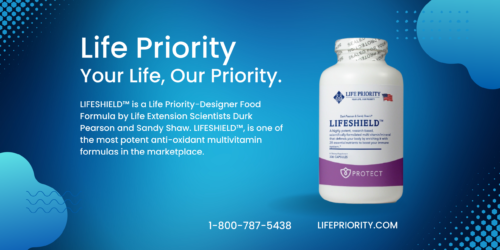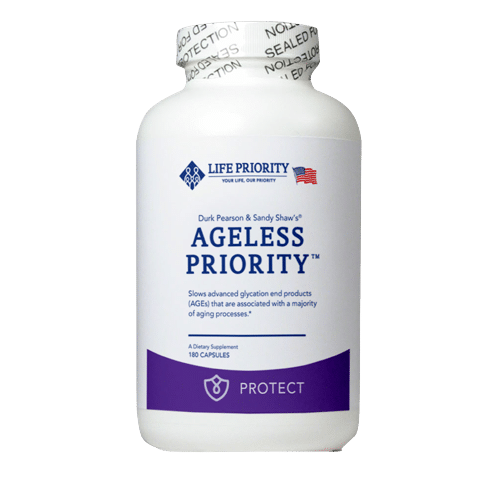

AGELESS PRIORITY – Durk Pearson & Sandy Shaw’s® Life Extension Newsletter™
- by Life Priority
- No Comments
- Post Views: 20
AGELESS PRIORITY
(C) 2010, 2023 by Durk Pearson & Sandy Shaw®
Durk Pearson & Sandy Shaw’s®
Life Extension Newsletter™
Reducing the Accumulation of AGEs with Rutin, Alpha-lipoic acid, Carnosine, Benfotiamine, Histidine, and Pyridoxine hydrochloride (Vitamin B-6)
As we have written earlier, certain nutrients, such as those listed above, have been found to be remarkably effective in preventing the formation of damaging AGEs. We incorporated the listed nutrients in a formulation we call AGELESS™ and we each take 6 capsules a day.
As an AGE-reduced diet in mice has been found to induce some of the same genetic changes as CR (calorie restricted) fed mice(1), we hope that taking AGE-reducing nutrients (as well as reducing cooking temperature as often as possible to decrease AGE formation in food) may
provide us with similar benefits.
In addition, to AGEless, we also take two servings a day of l-Arginine (6 grams per serving) plus cofactors in our Muscle Memory™.
Kidney Function Declines with age and AGEs and Is A Major Source of Mortality
According to a recent paper(1), twenty million adults in the UI.S. 20 years or older have an increased serum creatinine level (creatinine is cleared by the kidneys) and the incidence increases with age. The paper further notes that more than 20% of those age 65 years or older have decreased kidney function, even when corrected for obvious causes of kidney dysfunction such as hypertension and diabetes. Moreover, there is a strong association between age-associated chronic kidney disease and cardiovascular disease, since inflammatory mechanisms are involved in both.(1) Surprisingly, “results from a longitudinal study of normal [not diabetic] aging adults in Italy showed that the most significant correlation with mortality was the level of renal [kidney]function.” (1,1b)
Hence, if you have reached 65 years of age, having successfully avoided being done in prematurely by cardiovascular disease and cancer, declining kidney function is a major factor to consider in all-cause mortality and you should have your kidney functions tested regularly as part of your health assessment.
Declining kidney function in aging is associated with increased levels of the cytokine IL-6, C-Reactive Protein, and other markers of inflammation and oxidative stress. Importantly, increasing quantities of serum AGEs accumulate in the kidneys and impair their function. In a recent paper(1), the authors refer to studies showing that reducing AGEs in the diet of both animals and humans (by, for example, cooking foods at a lower temperature) is one effective way of reducing serum AGEs and protecting kidney function. Other ways (not discussed in this paper) include dietary supplements of nutrients that decrease the formation of AGEs or interfere with the pathways of damage initiated by AGEs.
Serum Advanced Glycation End Products (AGEs) Associated with Kidney Function Decline
The kidneys are the major way the body has for excreting AGEs to maintain the body load of AGEs at nontoxic levels.(1) It has been shown that during aging and in diabetes, the glomerular basement membrane of the kidneys are thickened, leading to less efficient kidney filtration.(2) (Interestingly, thickening of the basement membrane of other organs, such as the testes, also occurs with aging.) This thickening has been linked to glycosylation (an early part of the process that produces AGEs) of the collagen type IV that makes up more than 80% of the glomerular basement membrane material.(2)
AGE inhibitors have been reported to provide significant protection against cardiovascular disease as well as age-associated decline in kidney function.
Reducing Accumulation of AGEs in Kidneys with L-Arginine
The amino acid L-arginine has been shown to be a reducer of cross-linking in aging collage type IV and is strongly associated with a reduction of collagen accumulation of N-epsilon-(carboxymethyl)lysine (an AGE) in aging mice and in diabetic mice.(2)
Another paper attests to the kidney protective effects of l-arginine.(3) 12-13 month old rats treated for 8 months with l-arginine had their glomerular filtration rate increased by 50% as compared with untreated controls. Another study (4) reported that 12 week old hyperlipidemic hyperglycemic Golden Syrian hamsters had enhanced accumulation of fluorescent AGE-proteins in the vascular mesenteric bed and in the lens, which was decreased significantly by l-arginine treatment.
References
(1) Vlassara et al, “Identifying advanced glycation end products as a major source of oxidants in aging: implications for the management and/or prevention of reduced renal function in elderly persons,” SEMINARS IN NEPHROLOGY 29(6):594-603 (2009)
(1b) Pizzarelli et al, “Predictivity of survival according to different equations for estimating renal function in community-dwelling elderly subjects,” NEPHROL. DIAL. TRANSPLANT. 24:1197-1205 (2009)
(2) Radner et al, “L-arginine reduces kidney collagen accumulation and N-epsilon(carboxymethyl)lysine in the aging NMRI-mouse,” JOURNAL OF GERONTOLOGY: MEDICAL SCIENCES 49(2):M44-M46 (1994)
(3) Reckelhoff et al, “Long-term dietary supplementation with l-arginine prevents age-related reduction in renal function,” AM. J. PHYSIOL. 272 (REGULATORY INTEGRATIVE COMP. PHYSIOL. 41):R1768-R1774 (1997)
(4) Georgescu and Popov, “Age-dependent accumulation of advanced glycation endproducts is accelerated in combined hyuperlipidemia and hyperglycemia, a process attenuated by l-arginine,” J. AMER. AGING ASSOC. 23:33-40 (2000)
Sign up for emails from OneHeartNetwork.com:
By providing your email address, you are agreeing to our privacy policy.
RECOMMENDED


Tribute To Durk Pearson and Sandy Shaw
AGELESS PRIORITY
(C) 2010, 2023 by Durk Pearson & Sandy Shaw®
Durk Pearson & Sandy Shaw’s®
Life Extension Newsletter™
Reducing the Accumulation of AGEs with Rutin, Alpha-lipoic acid, Carnosine, Benfotiamine, Histidine, and Pyridoxine hydrochloride (Vitamin B-6)
As we have written earlier, certain nutrients, such as those listed above, have been found to be remarkably effective in preventing the formation of damaging AGEs. We incorporated the listed nutrients in a formulation we call AGELESS™ and we each take 6 capsules a day.
As an AGE-reduced diet in mice has been found to induce some of the same genetic changes as CR (calorie restricted) fed mice(1), we hope that taking AGE-reducing nutrients (as well as reducing cooking temperature as often as possible to decrease AGE formation in food) may
provide us with similar benefits.
In addition, to AGEless, we also take two servings a day of l-Arginine (6 grams per serving) plus cofactors in our Muscle Memory™.
Kidney Function Declines with age and AGEs and Is A Major Source of Mortality
According to a recent paper(1), twenty million adults in the UI.S. 20 years or older have an increased serum creatinine level (creatinine is cleared by the kidneys) and the incidence increases with age. The paper further notes that more than 20% of those age 65 years or older have decreased kidney function, even when corrected for obvious causes of kidney dysfunction such as hypertension and diabetes. Moreover, there is a strong association between age-associated chronic kidney disease and cardiovascular disease, since inflammatory mechanisms are involved in both.(1) Surprisingly, “results from a longitudinal study of normal [not diabetic] aging adults in Italy showed that the most significant correlation with mortality was the level of renal [kidney]function.” (1,1b)
Hence, if you have reached 65 years of age, having successfully avoided being done in prematurely by cardiovascular disease and cancer, declining kidney function is a major factor to consider in all-cause mortality and you should have your kidney functions tested regularly as part of your health assessment.
Declining kidney function in aging is associated with increased levels of the cytokine IL-6, C-Reactive Protein, and other markers of inflammation and oxidative stress. Importantly, increasing quantities of serum AGEs accumulate in the kidneys and impair their function. In a recent paper(1), the authors refer to studies showing that reducing AGEs in the diet of both animals and humans (by, for example, cooking foods at a lower temperature) is one effective way of reducing serum AGEs and protecting kidney function. Other ways (not discussed in this paper) include dietary supplements of nutrients that decrease the formation of AGEs or interfere with the pathways of damage initiated by AGEs.
Serum Advanced Glycation End Products (AGEs) Associated with Kidney Function Decline
The kidneys are the major way the body has for excreting AGEs to maintain the body load of AGEs at nontoxic levels.(1) It has been shown that during aging and in diabetes, the glomerular basement membrane of the kidneys are thickened, leading to less efficient kidney filtration.(2) (Interestingly, thickening of the basement membrane of other organs, such as the testes, also occurs with aging.) This thickening has been linked to glycosylation (an early part of the process that produces AGEs) of the collagen type IV that makes up more than 80% of the glomerular basement membrane material.(2)
AGE inhibitors have been reported to provide significant protection against cardiovascular disease as well as age-associated decline in kidney function.
Reducing Accumulation of AGEs in Kidneys with L-Arginine
The amino acid L-arginine has been shown to be a reducer of cross-linking in aging collage type IV and is strongly associated with a reduction of collagen accumulation of N-epsilon-(carboxymethyl)lysine (an AGE) in aging mice and in diabetic mice.(2)
Another paper attests to the kidney protective effects of l-arginine.(3) 12-13 month old rats treated for 8 months with l-arginine had their glomerular filtration rate increased by 50% as compared with untreated controls. Another study (4) reported that 12 week old hyperlipidemic hyperglycemic Golden Syrian hamsters had enhanced accumulation of fluorescent AGE-proteins in the vascular mesenteric bed and in the lens, which was decreased significantly by l-arginine treatment.
References
(1) Vlassara et al, “Identifying advanced glycation end products as a major source of oxidants in aging: implications for the management and/or prevention of reduced renal function in elderly persons,” SEMINARS IN NEPHROLOGY 29(6):594-603 (2009)
(1b) Pizzarelli et al, “Predictivity of survival according to different equations for estimating renal function in community-dwelling elderly subjects,” NEPHROL. DIAL. TRANSPLANT. 24:1197-1205 (2009)
(2) Radner et al, “L-arginine reduces kidney collagen accumulation and N-epsilon(carboxymethyl)lysine in the aging NMRI-mouse,” JOURNAL OF GERONTOLOGY: MEDICAL SCIENCES 49(2):M44-M46 (1994)
(3) Reckelhoff et al, “Long-term dietary supplementation with l-arginine prevents age-related reduction in renal function,” AM. J. PHYSIOL. 272 (REGULATORY INTEGRATIVE COMP. PHYSIOL. 41):R1768-R1774 (1997)
(4) Georgescu and Popov, “Age-dependent accumulation of advanced glycation endproducts is accelerated in combined hyuperlipidemia and hyperglycemia, a process attenuated by l-arginine,” J. AMER. AGING ASSOC. 23:33-40 (2000)



